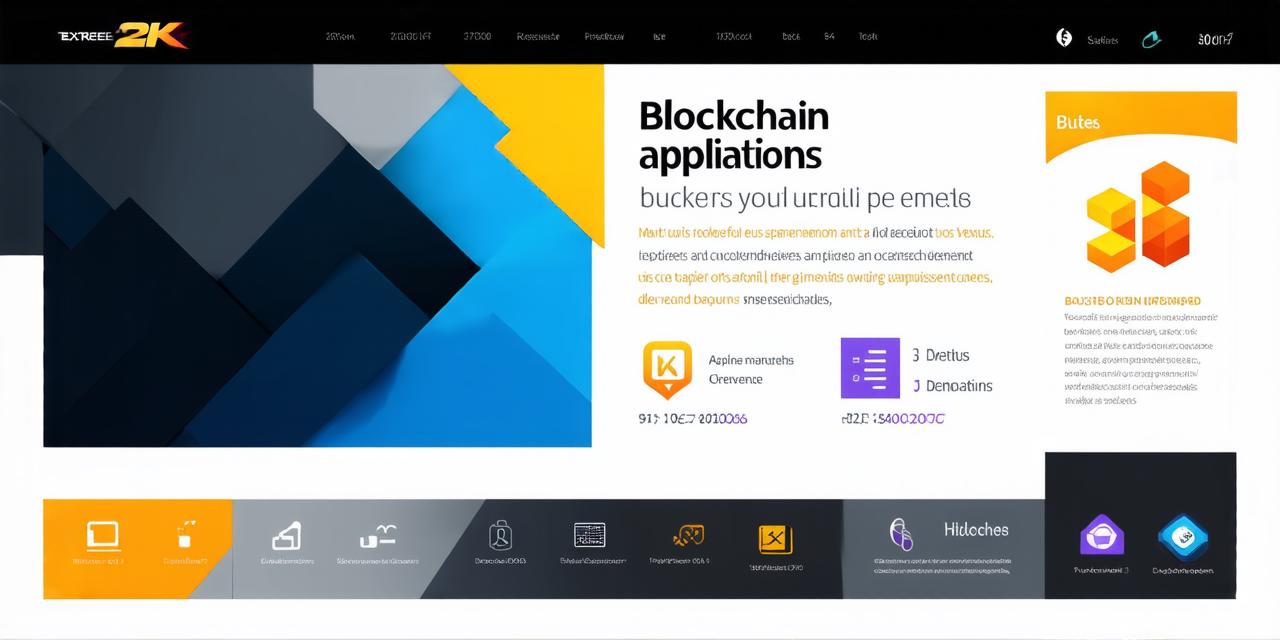What are Blockchain Applications?
Blockchain applications refer to software programs that utilize blockchain technology to store and manage data in a secure and decentralized manner. The most well-known blockchain application is the cryptocurrency Bitcoin, which uses blockchain technology to facilitate peer-to-peer transactions without intermediaries. However, blockchain applications can be used for a wide range of purposes, including supply chain management, voting systems, identity verification, and more.
The key features that make blockchain applications unique are decentralization, transparency, immutability, and security. Decentralization means that the data is stored on a distributed network rather than in a central database controlled by a single entity. Transparency refers to the ability of anyone to view the data stored on the blockchain, while immutability means that once data is recorded on the blockchain, it cannot be changed or deleted. Finally, security ensures that data stored on the blockchain is protected from unauthorized access and tampering.
The Potential of Blockchain Applications
Blockchain applications have the potential to transform various industries by providing a more secure, transparent, and efficient way of managing data. Here are some examples:
- Finance
Blockchain technology has already disrupted the traditional banking system with the rise of cryptocurrencies like Bitcoin and Ethereum. These digital currencies use blockchain technology to facilitate peer-to-peer transactions without intermediaries, making them faster and more cost-effective than traditional bank transfers. Blockchain technology can also be used for smart contracts, which are self-executing contracts that automatically enforce the terms of an agreement. This has the potential to reduce fraud, increase efficiency, and lower costs in various industries such as supply chain management and real estate. - Supply Chain Management
Blockchain technology can be used to create a more transparent and efficient supply chain by providing a tamper-proof record of every transaction and movement of goods. This can help reduce fraud, improve traceability, and increase efficiency in the supply chain. For example, Walmart has implemented blockchain technology to track the origin and movement of food products, which has helped identify contaminated products and prevent them from reaching consumers. - Healthcare
Blockchain technology can be used to create a more secure and efficient healthcare system by providing a tamper-proof record of patient data. This can help reduce errors, improve privacy, and increase efficiency in the healthcare system. For example, IBM has partnered with various healthcare providers to develop blockchain-based solutions for managing patient data, clinical trials, and drug supply chain management. - Voting Systems
Blockchain technology can be used to create more secure and transparent voting systems that prevent fraud and increase transparency. This can help improve the integrity of elections and increase trust in the democratic process. For example, West Virginia has implemented a blockchain-based voting system that allows voters to vote securely online and ensures that their vote is counted accurately. - Identity Verification

Blockchain technology can be used to create a more secure and efficient identity verification system that eliminates the need for physical IDs and reduces fraud. This can help improve privacy, reduce costs, and increase efficiency in various industries such as banking and e-commerce. For example, Deloitte has partnered with various organizations to develop blockchain-based solutions for identity verification that use biometric data and smart contracts.Case Studies
- Maersk and IBM
Maersk, a Danish shipping company, and IBM have partnered to develop a blockchain-based solution for managing the global supply chain of goods. The solution, called TradeLens, uses blockchain technology to provide a tamper-proof record of every transaction and movement of goods in the supply chain. This has helped reduce fraud, improve traceability, and increase efficiency in the supply chain. - Gem
Gem, a New York-based blockchain company, has developed a blockchain-based solution for managing digital assets such as artwork and collectibles. The solution uses smart contracts to automate the buying and selling of digital assets, making it faster and more cost-effective than traditional methods. This has helped increase efficiency and reduce costs in various industries such as art and collectibles. - MediLedger
MediLedger, a blockchain-based solution for managing pharmaceutical supply chains, has been implemented by several major pharmaceutical companies including Pfizer, Merck, and Johnson & Johnson. The solution uses blockchain technology to provide a tamper-proof record of every transaction and movement of drugs in the supply chain, helping prevent counterfeit drugs from reaching consumers and reducing fraud.Summary
Blockchain technology has the potential to transform various industries by providing a more secure, transparent, and efficient way of managing data. While there are still challenges to overcome, such as scalability and regulatory hurdles, the potential benefits of blockchain applications are significant. As more companies adopt blockchain technology, we can expect to see even more innovative use cases emerge in various industries.
